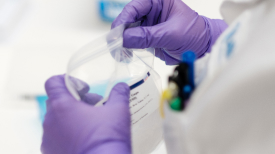- Cancer Care Team
Cancer Care Team
To deliver optimal patient outcomesProducts and Services
Cancer Type
Supplies & Tools
Scientific Focus
- Biopharma Partners
- Patients
- Education & Events
- Login
- Contact Us
Test Details
 Cancer Type
Cancer Type
Colorectal cancer (CRC), Endometrial, Hereditary cancer, Lynch syndrome
 Technology Used
Technology Used
Molecular
 Turnaround Time
Turnaround Time
21 - 28 days
Use
Identify who in a family harbors the familial mutation and is at high risk of the disease and who does not harbor the familial mutation and is not at increased risk of the disease. Family testing for known familial mutations can identify presymptomatic mutation carriers within affected families who are at high risk of developing the familial disease.
Special Instructions
This option is available when the mutation is known and can be documented by the ordering physician. If the mutation cannot be documented, please order 511630.
Test orders must include an attestation that the provider has the patient's informed consent for genetic testing. See sample physician office consent form: Consent for Genetic Testing. In the case of family tests (ie, known mutations), please submit the result report of the first patient tested in the family (the index case), if not performed at a LabCorp facility. Other family members are subsequently tested for the specific mutation found in the first patient tested.
Limitations
Selected regions of the coding sequence of PMS2 are amplified by polymerase chain reaction and each PCR product amplicon) then sequenced bi-directionally, using Sanger sequencing. Nucleotide and codon number are based on the mRNA isoform NM_000535 for the PMS2 gene.
Sequencing cannot detect variants in regions not covered by this analysis, including noncoding or deep intronic variants and may not reliably detect changes in repetitive elements, such as microsatellite repeats. Sequencing may not detect mosaic variants, inversions, or other genomic rearrangements such as transposable element insertions. Sequence analysis may also be affected by allele drop-out due to the presence of a rare variant under a primer site or homopolymeric regions. The method does not allow any conclusion as to whether two heterozygous variants are present on the same or on different chromosome copies.
The presence of pseudogenes can interfere with the ability to detect variants in certain genes. For example, deletion/duplication analysis of PMS2 exons 11-15, among others, is complicated by the highly homologous PMS2CL pseudogene. Deletions/duplications in PMS2CL have not been associated with Lynch syndrome; however, this assay may not be able to determine if a deletion/duplication affects PMS2 or PMS2CL.
This test is not intended to detect somatic variants. Bone marrow transplantation may affect the outcome of these results. Please contact LabCorp to discuss testing options at 1-800-345-GENE.
This test was developed, and its performance characteristics determined, by LabCorp. It has not been cleared or approved by the US Food and Drug Administration (FDA).
Methodology
DNA sequencing
Specimen Requirements
Information on collection, storage, and volume
Specimen
Whole blood; DNA is accepted (Call 800-345-4363 for DNA collection information.)
Volume
2 mL
Container
Lavender-top (EDTA) tube
Storage Instructions
Maintain specimen at room temperature.
Causes for Rejection
Container broken or leaking; container not labeled or label not legible; improper anticoagulant
Collection
Samples may be stored for brief periods at 4°C. Ship overnight at room temperature.
Related Tests
Find more tests related to this one.





